Financing the economic transition – Building bridges between sustainability, growth and monetary stability
Geopolitical caesura shapes the agenda
Russia's war on Ukraine, which violates international law, marks a geopolitical turning point. This also sets the agenda for economic transformation. The consequences of the corona pandemic in the form of rising energy and food prices as well as persistent material bottlenecks and supply chain problems now demand even more timely responses. Combined with global inflation and climate crises, a seemingly perfect storm throws European economies into disarray. Current developments will have consequences for the financing of economic transformation under new geopolitical auspices. In times of extreme uncertainty, in particular asset-based financing instruments can and should jolt distressed European economies back to life.


Energy transition and EU sustainability regulation
Energy transition and economic transformation cannot be delayed. Friendshoring in response to crisis developments overwhelms well-established models of international business cooperation. EU sustainability regulation extends to global value chains and poses enormous challenges for all companies, says Clemens Koch, Member of the Executive Board of PwC Germany at the opening panel. Regulation thus sets the framework for the reorganisation of economic blocs in the world. The question arises as to how the German economy can succeed in a timely transformation.
It is the task of politics to maintain an appropriate regulatory framework. Sustainable Finance may prove to be a burden for the transformation. In practice, the taxonomy may boil down to a division of the world into sustainable and non-sustainable activities, according to Christoph Kaserer of the Technical University of Munich. Of course, protection against greenwashing and integrated risk management that adequately takes sustainability risks into account are justified goals of sustainable finance. Increased market transparency through standardised and reliable non-financial information creates guidance. This is a prerequisite for a targeted redirection of financial and investment flows into sustainable investments. However, sustainable finance leads to regulatory pettiness. In the view of Felix Hufeld, former President of BaFin, there is a lack of courage for principle-based regulation. Marcus Pratsch, Head of Sustainable Bonds & Finance at DZ BANK, concluded that regulation should increasingly allow for financing the transition towards sustainability. It is important that business models that are already green do not become a shade greener, but that previously non-green activities can become greener. For the energy transition to succeed in a timely manner, sustainable finance should therefore not become a compliance exercise at the expense of the business sector but must encourage innovation. If technical possibilities do not allow for an immediate switch to green, then Sustainable Finance should also allow for compensatory measures such as, for example, crediting of equivalences in the CO2 balance, said Frank Fiedler, CFO of Volkswagen Financial Services. If the European stance on sustainable finance proves to be compatible to sustainability regulation at global level, then it may also be possible to mobilise economic savings in the rest of the world to finance the energy transition and economic transformation of European economies.
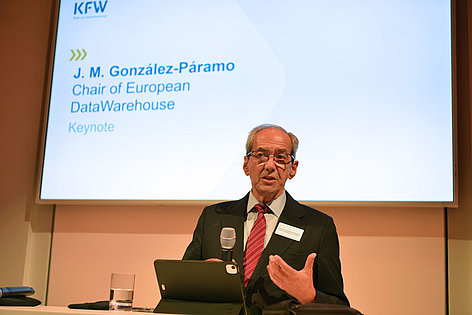

How will investments in economic transformation be financed?
In his opening speech at the KfW, José Manuel Gonzáles-Paramo, Senior Advisor to the ECB, estimated the need for investments at EUR 650 bn per year until 2030. It is obvious that a considerable part of such extremely large amounts must and will be funnelled through capital markets. Private debt plays an important role in new industries and technology fields. According to Stefan Bund of SDG Investments, banks are not able to handle this kind of grassroot financing. Corresponding project financing can nevertheless be financed by banks in the late phase and refinanced via securitisations. Sebastian Schütz, Head of Structural Capital Market Affairs at Deutsche Bundesbank, also stressed that private debt may put stress on financial market stability. There's no doubt that banks' lending capacity is key for the recovery of European economies and their transition towards sustainability. In José Manuel Gonzáles-Paramo’s view, securitisation can and should play an important role here.

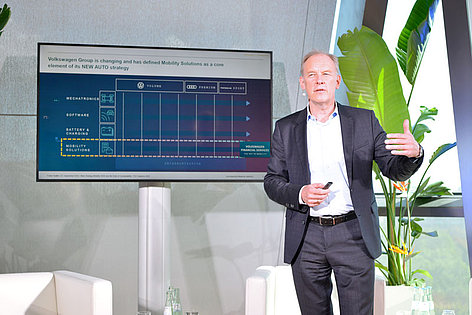
Improving the framework conditions for financing the real economy
Due to their SME-structure, bank balance sheets are the only access to financing for the bulk of the real economic business sector. In light of the volumes required to finance the economic transformation, linking bank-based financing with capital markets plays a key role. As regards the regulatory increase in risk weights (keyword here “Basel IV”), the additional burdens from the foreseeable recession and the associated rating migrations, a need for capital relief in banking through securitisation arises. If traditional originator-based financing has to take a back seat, asset-based forms of financing will become all the more important. Already today, the demand for working capital financing is increasing noticeably, especially in the form of securitisation of trade receivables. However, only large companies are directly taking advantage of such opportunities. Not least because of regulatory requirements, access to the securitisation market is insurmountable for companies with trade receivables of EUR 40 million, for example, said Dirk Jandura, President of BGA and Managing Director in electrical wholesale.
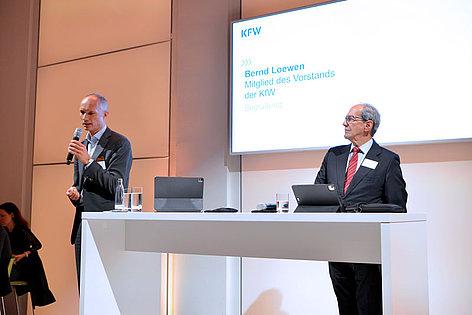
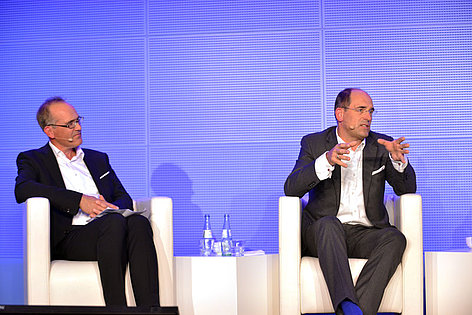
Could a new securitisation platform help the market development?
More appropriate European and national measures can advance the linking of bank-based financing with capital markets. A securitisation platform in Germany could facilitate the necessary expansion of credit supply, especially for SMEs. This was also the assessment of Bernd Loewen, CFO of KfW, in his welcoming speech.


Positive impetus from decentralised finance, DLT and new business models
Economic transformation does not only concern sustainability, but also the digital economy. The digitalisation of processes in the course of decentralised finance as well as alternative financing solutions such as lending platforms can provide additional impetus for growth and transformation towards more sustainability. DLT is a technology that substantially changes the existing ecosystem for finance. Instead of a more centralised, rather “trust-based” intermediation, smart contracting enables a higher quality level of market transparency, says Philipp Schulden, COO of Rudy Capital. For securitisations, this development offers huge opportunities: new asset classes and much larger volumes can be securitised and traded, says Nick Wittek, partner at Jones Day. The trend towards Asset-as-a-Service favours asset-based forms of financing. In a few years, digitalisation will grow out of its infancy, and it will become obvious, says Michael Spitz of 360X, that decentralised finance enables more social inclusion through a broader capital market.

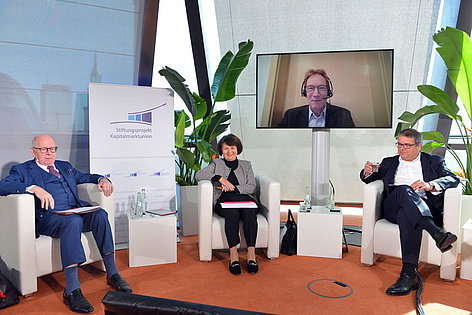
Cautiously positive outlook for securitisation markets
With the turnaround in interest rate policy, a repricing of spreads has taken place. The current crisis, especially the Cost-of-Living-Crisis, affects portfolios and thus the performance of securitisations. Much will depend here on the type and scope of energy relief packages, says Susanne Matern, Managing Director at Fitch Ratings. Auto and consumer ABS as well as RMBS as the most important asset classes have shown a stable performance so far and will probably continue to do so, says Philip Reicherstorfer of AUTO1 Global Services. Ratings of existing transactions have priced in the current stress scenario, emphasises Armin Krapf, Vice President of Moody's Germany. However, the economic environment is becoming more difficult. Much depends on economic-policy management of inflation expectations as well as of supply-side disruptions in global value chains. Due to the decreasing relevance of the ECB as a source of refinancing, the securitisation market may even gain in importance, according to Bernhard Zahel of DWS Investment. Accordingly, a level playing field must be guaranteed for asset-based financing solutions. From an economic point of view, this contributes to securing financial market stability as well.

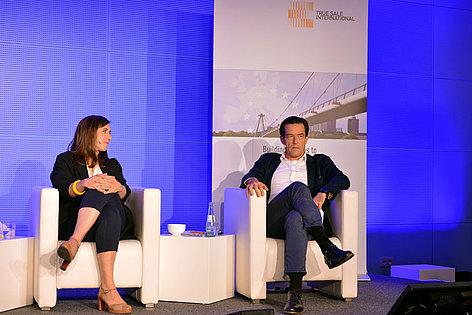
Politics looks ahead
At the Closing Forum, politicians and business leaders discussed the question posed by moderator Stephan Richter, editor-in-chief of The Globalist, whether the geopolitical trend towards de-globalisation or Germany's long-neglected competitiveness poses the greatest challenge. The consensus is that one should do the one thing without abandoning the other. Politicians are clearly committed to a more supply-oriented economic policy in the future, according to MdB Michael Meister (CDU). Volker Treier, Head of Foreign Trade at the Association of German Chambers of Commerce and Industries (DIHK), stressed the importance of enabling companies to diversify their risks globally and at the same time of providing incentives for domestic investments. There is no doubt that private investments are at the heart of financing economic transformation. Nevertheless, MdB Katharina Beck (Bündnis90/Die Grünen) and MdB Lukas Köhler (FDP) emphasised that public funds must be put in hand in the short term to counter cash-flow problems, not least for industry. Either way, the thrust is clear: Securitisation may offer a way out of current crisis developments and into economic transformation.


